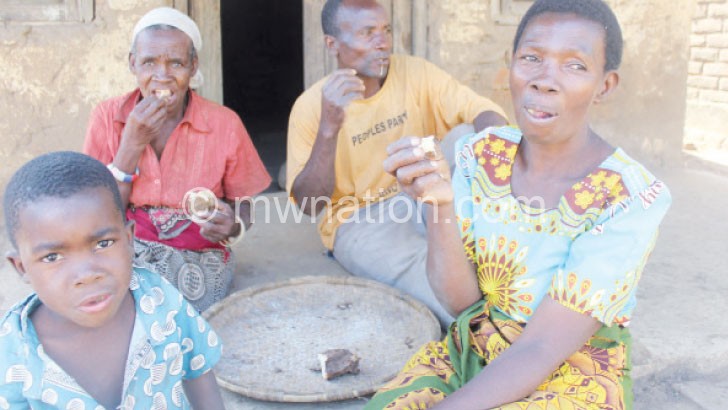Tackling food insecurity
It may just be the beginning of a lean season in Malawi, but every day of the past growing season was hell for Alinafe Nkhoma of Msomali Village in Phalombe.
After losing her livelihood to Cyclone Idai in March 2019, Nkhoma’s family endured a prolonged dry spell that hit most parts of the Southern Region earlier this year.
As if that was not enough, in March, the Covid-19 pandemic weighed in, forcing the government to restrict travel and public gatherings to reduce coronavirus spread.
Covid crisis

The measures, including the requirement to stay at home, avoid public gatherings and social distance disrupted Nkhoma’s income, forcing her family to live hand-to-mouth with no end in sight.
“In 2019, we didn’t harvest much, but the situation was bearable because most organisations were distributing relief food,” says the mother of six.
To survive, Nkhoma and her husband, John Kapasule, wake up early and trek for about four hours to hunt for wild tubers up the mountains in the rural locality in Traditional Authority Nazombe. They boil the potato-like tubers for about six hours to make them less toxic.
“Due to hunger, the scramble for the wild tubers has become high. Every day, over 100 families climb the mountains to dig for tubers, which taste like potatoes,” Kapasule narrates.
During the interview, Kapasule and his wife were eating the tubers in the shade of their house. This was their only meal for the day.
Nkhoma counts herself lucky that the wild tubers have not done any harm to their lives or health, but admits hearing cases of people dying after eating poisonous tubers.
In April, a woman and two girls in Chikwawa died after eating toxic he wild tubers.
But for Nkhoma, the tubers have become the only option for families which cannot afford food as the lean season kicks in, raising the cost of maize, the country’s staple food.
A 50-kilogramme bag of maize now costs about K10 000, but grain prices are already hovering around K13 000 in disaster-hit areas such as Phalombe.
Worsening crisis
Nkhoma’s family is not the only family hit by hunger.
In T/A Nkhulambe, some five kilometres away, Eluby Simeon of Muruwese Village is not sure where the next meal will come from.
The 82-year-old, who stays with three grandchildren, can only afford a single meal per day.
Being a head of the household and unable to work as she used to when she was younger, she survives on handouts from her two married daughters and well-wishers.
But with the hunger faced by most households in her rural setting, Simeon can no longer afford three meals a day.
She appeals for assistance from government and well-wishers so poor households can meet their food needs as hunger bites harder.
“I just hear there is a cash transfer programme targeting poor and labour-constrained households, but I wonder why I am not being considered for the same, considering that I am too old to fend for myself and my grandchildren. Hunger is killing me,” she says.
The two households in Phalombe are just two of about 2.7 million families likely to be hit by hunger this year, according to the Malawi Vulnerability Assessment Committee (Mvac) report released in September.
Looming hunger
This means that about 15 percent of the country’s population requires food support from this month to March 2021. Like Nkhoma and Simeon, some 1.9 million of the food-insecure households live in rural areas where 84 percent of the country’s population lives.
Mvac attributes the worsening food insecurity to weather shocks such as floods and prolonged dry spells as well as fall army worms and the Covid-19 pandemic which have reduced the income and resilience of poor families.
According to the Department of Disaster Management Affairs, the government is putting in place lean period support to cushion Malawians from hunger.
Act swiftly
But ActionAid Malawi (AAM) emergency and resilience specialist Tchaka Kamanga urges the government to swiftly come to the rescue of the families in need of food support.
He asks government to increase support towards poor and labour-constrained households through social protection programmes such as social cash transfers.
AAM, a charity organisation which works closely with local partners in Malawi, will be running a cash-transfer programme to enable targeted poor and vulnerable households earn some income for buying food.





